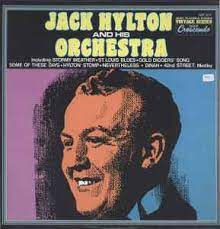
Daily Dose Of Jazz…
Jack Hylton was born John Greenhalgh Hilton on July 2, 1892 in Great Lever near Bolton, Lancashire, England the son of a cotton yarn twister and an amateur singer at the local Labour Club. He learned piano to accompany him on the stage and later sang to the customers when his father bought a pub in nearby Little Lever, becoming known as the Singing Mill-Boy. He also performed as a relief pianist for various bands.
Moving to London, England as a pianist in the 400 Club during his early career and playing with the Stroud Haxton Band. During World War I he became musical director of the band of the 20th Hussars, and later in the Army Entertainment Division. After the war Hylton formed a double act with Tommy Handley to little success, played with the Queens Dance Orchestra, wrote arrangements of popular songs and recorded them for His Master’s Voice and Zonophone under the label Directed by Jack Hylton. His records carried the new style of jazz-derived American dance music.
Dismissed by his own bandmates from the Queen’s Hall in 1922, Jack not only set up his own band, but also set up a number of other orchestras under the Jack Hylton Organisation. Even though he was not professionally trained for business, he brought his band to success during the Great Depression. He is credited for bringing Duke Ellington, Louis Armstrong and others to Britain and Europe in the 1930s.
Hylton also became a director and major shareholder of the new Decca record label, recorded with Paul Robeson, and made the first transatlantic entertainment broadcast with Paul Whiteman and his orchestra. He performed in the United States when Standard Oil signed him for a radio show on CBS. Returning to Britain he toured Europe, appeared on radio and television and finally disbanded by 1940.
He continued to conduct orchestras for radio in the years to come, leading the Glenn Miller Orchestra when it visited England in 1943. During the war, he took the London Philharmonic Orchestra around Britain, giving promenade concerts. At this point in his career he became an impresario, discovering new stars and managing radio, film and theatre productions.
The Fifties saw him reuniting with old band members for that year’s Royal Command Performance, billed as “The Band that Jack Built”. He founded Jack Hylton Television Productions, which lasted until 1960. IIn his final years Hylton was still producing stage shows, as well as taking a leading role in organising various Royal Command Performances, until his final stage production, Camelot, in 1965.
Complaining of chest and stomach pains he was admitted to the London Clinic, where three days later on January 29, 1965 1892~1965 | pianist, composer, bandleader and impresario Jack Hylton transitioned from a heart attack. He was 72.
More Posts: bandleader,history,impresario,instrumental,jazz,music,piano
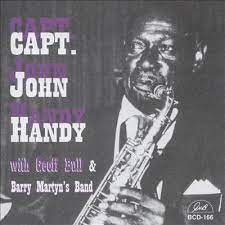
Daily Dose Of Jazz…
Captain John Handy was born on June 24, 1900 in Pass Christian, Mississippi. His father, John Handy Sr., had a family band that included two of his brothers, Sylvester and Julius. Although he also played guitar, mandolin, and drums at an early age, he chose reeds to develop his professional musical career, beginning with clarinet and then migrating to saxophone.
He moved to New Orleans, Louisiana in 1915 and during the 1920s played clarinet working with Kid Rena and Punch Miller. He switched to alto saxophone in 1928. From the early 1930s he led the Louisiana Shakers with his brother Sylvester, and toured throughout the South. In the latter 1930s Handy worked with Charles Creath in St. Louis, Missouri.
Captain John returned to New Orleans in the 1940s, where he performed with the Young Tuxedo Brass Band. Handy was interviewed several times for the Hogan Jazz Archive at Tulane University in New Orleans in the late 1950s and early Sixties. During the 1960s, he played with Kid Sheik Cola and the Preservation Hall Jazz Band and recorded for GHB, RCA, and Jazz Crusade.
Alto saxophonist Captain John Handy, who was part of the New Orleans jazz revival, transitioned in New York on January 12, 1971 at the age of 70.
More Posts: bandleader,clarinet,history,instrumental,jazz,music,saxophone
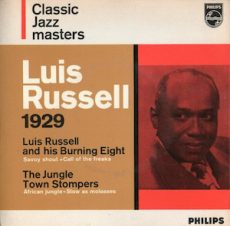
Daily Dose Of Jazz…
Harry Alexander White was born on June 1, 1898 in Bethlehem, Pennsylvania. As a teenager, he played drums, then switched to trombone after moving to Washington, D.C. around 1919. In the early Twenties he played with Duke Ellington, Elmer Snowden, and Claude Hopkins. Then in 1925 he formed the family band called the White Brothers Orchestra, which played the mid-Atlantic states for several years with regular gigs in New York City and Philadelphia, Pennsylvania.
Late in the 1920s, he played with Luis Russell, then joined the Mills Blue Rhythm Band in 1931. The following year he joined Cab Calloway’s orchestra, working as an arranger and composer in addition to his duties on trombone. One of Calloway’s trumpeters, Edwin Swayze, overheard Harry use the term “jitterbug”, and wrote a tune called The Jitterbug. Calloway’s 1934 recording of the song brought the term into widespread currency.
Returning to play with Russell in 1935 when the band was backing Louis Armstrong, he eventually quit playing for part of the Thirties decade. He would later perform with Manzie Johnson, Hot Lips Page, Edgar Hayes, and Bud Freeman.
Trombonist, pianist, saxophonist, arranger and composer Harry White, who was affectionately known as Father White, transitioned on August 14, 1962 in New York City.
More Posts: arranger,bandleader,composer,history,instrumental,jazz,music,piano,saxophone,trombone
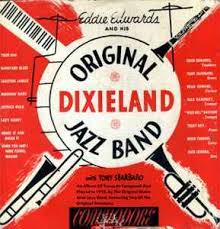
Daily Dose Of Jazz…
Edwin Branford “Eddie” Edwards was born on May 22, 1891 in New Orleans, Louisiana and started on violin at age 10 and five years later he picked up the trombone. In 1916, he was chosen to go to Chicago, Illinois by Alcide Nunez to play trombone with Johnny Stein’s Jazz Band. With a few changes of personnel, this band became the Original Dixieland Jass Band, which made the first jazz records in 1917. He played on one of the first commercially released jazz recordings, Livery Stable Blues, later released as Barnyard Blues.
Leaving the band after being drafted into the United States Army, he served from July 1918 to March 1919. After being discharged, Eddie led his own band and worked in Jimmy Durante’s band before returning to the Original Dixieland Jass Band. After that band broke up, he again led a band in New York City for most of the 1920s until retiring from music in the early Thirties. He then ran a newspaper stand and worked as a sports coach.
Coming out of retirement he returned to music in 1936 when Nick LaRocca reformed the Original Dixieland Jazz Band, playing with them until 1938. He played in other bands with Larry Shields, Tony Sbarbaro, and J. Russell Robinson in New York City into the 1940s. He continued playing professionally intermittently until shortly before his death.
His composition Sensation Rag or Sensation was performed at the 1938 Benny Goodman jazz concert at Carnegie Hall and was included on the album The Famous 1938 Carnegie Hall Jazz Concert. Darktown Strutters’ Ball, composed by Shelton Brooks, a Black man, was recorded by the Original Dixieland Jass Band and inducted into the Grammy Hall of Fame in 2006.
Trombonist Eddie Edwards, who played both violin and trombone, and who also played minor-league baseball and worked as an electrician, transitioned on April 9, 1963 in his hometown at the age of 71.
More Posts: bandleader,history,instrumental,jazz,music,trombone,violin
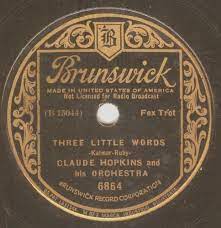
Daily Dose Of Jazz…
Pete Edward Jacobs was born on May 7, 1899 in Asbury Park, New Jersey. He played in the Musical Aces, then joined the band of Claude Hopkins from 1926 to 1928. He left Hopkins to play with Charlie Skeete in 1928, then returned to play with Hopkins from 1928 until 1938.
During this ten-year tenure in Hopkins’s orchestra, Pete recorded extensively with the group on Brunswick Records, particularly during the period 1927 to 1932. Additionally, he appeared with the band in the short films Barbershop Blues and By Request.
He fell ill in 1938 and had to quit the group, and never returned to active performance. Drummer Pete Jacobs transitioned in 1952.
More Posts: drums,history,instrumental,jazz,music




